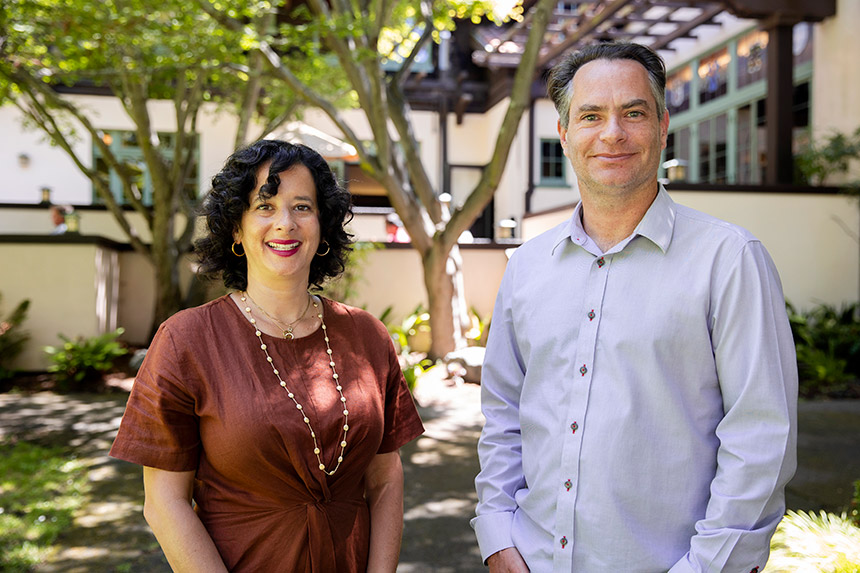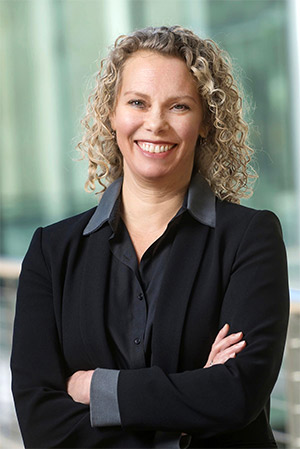
By Sarah Weld
After shepherding Berkeley Law’s Clinical Program through two years of a global pandemic, International Human Rights Law Clinic Co-Director Laurel E. Fletcher has handed the baton to fellow Co-Director Roxanna Altholz ’99 and Death Penalty Clinic Co-Director Ty Alper.
The surging program — which currently houses six in-house and eight community-based clinics — plans to add three more in-house clinics and four professors over the next five years.
“Clinics used to be something law students would discover,” says Altholz ’99. “Now, they’re the reason why many students come to law school. Clinics are labs of justice that are sites of innovation, and also places where students are given the building blocks for a career that has meaning, not just to them, but for their communities. There’s no better place to learn lawyering skills.”
Alper, who joined Berkeley Law with Altholz in 2005, sees clinics especially appealing to students in today’s political climate.
“They’re questioning whether the institutions they believed in can actually work to protect democracy and justice,” he says. “We offer an opportunity for students to see that this conservative institution of the law can actually be used in radical ways to disrupt entrenched patterns of oppression and racism.”

Dean Erwin Chemerinsky, who has made student participation in clinics and their growth a strong priority since arriving in 2017, says he is “delighted and tremendously grateful” that Alper and Altholz have taken the reins.
“I am also very appreciative to Professor Laurel Fletcher for her terrific work in this role for the last two years,” Chemerinsky adds. “This is an exciting time of expansion for our clinics, which provide an outstanding experience for Berkeley Law students. I know that Roxanna and Ty will do a superb job leading our Clinical Program.”
When Fletcher took over in the summer of 2020, in the midst of COVID-19 and nationwide protests following George Floyd’s murder, she worried that students would lack the time and energy to enroll in the rigorous program, which was entirely remote. Instead, she found that demand only increased.
“We heard from students that clinics were the place where they could be impactful at a time when they could see so much need and suffering and they wanted to make a difference. I shouldn’t have been surprised. Public service and social justice — that’s the Berkeley brand,” says Fletcher, a faculty member since 1998. “Some of the best work I’ve seen from students came during the pandemic.”
Real-world experience
Led by faculty members and practitioners with deep expertise in their fields, the 14 clinics offer students a complement to their traditional classroom experience. Weekly seminars give students a foundation in law and practice, and hands-on casework builds critical lawyering skills such as oral advocacy and research while serving disenfranchised individuals and communities.
“These are not simulations. They are practicing as student lawyers with all the responsibility that lawyers have, but with the safety net of experienced clinical supervisors,” Alper says. “They can make the mistakes they will inevitably make, and have the space and training to reflect on those mistakes, which is something you often don’t have time for in real-life practice.”
Students consistently contribute vital work to groundbreaking reports and legal filings, simultaneously helping the clinics achieve their mission of advancing racial, economic, and social justice while offering direct legal experience.
Last year, for example, Death Penalty Clinic students helped investigate peremptory challenges in Kansas criminal trials, East Bay Community Law Center students participated in a campaign to end civil assessments (additional fees levied if certain fines for traffic or criminal violations aren’t paid on time) in California, and Environmental Law Clinic students researched racial disparities in exposure to toxic chemicals.
Also, International Human Rights Law Clinic students worked on a criminal complaint against the Mexican attorney general’s office for illegally surveilling human rights defenders, New Business Community Law Clinic students helped a small business owner move her restaurant online during COVID-19, Policy Advocacy Clinic students supported a national campaign to abolish juvenile criminal legal system fees, and Samuelson Law, Technology & Public Policy Clinic students prepared a fellow student to argue in federal court for public access to surveillance record requests.
Growth spurt
These opportunities for students will only increase as the Clinical Program kicks off its significant expansion this year. Stephanie Campos-Bui ’14, a longtime presence in the program who started as a Policy Advocacy Clinic student and then became a teaching fellow, supervising attorney, and deputy director, just accepted a tenure-track offer as an associate clinical professor — the first of five planned tenure-track hires.
The Environmental Law Clinic plans to hire a second tenure-track professor in the coming academic year. And this spring, the program will begin searching for a new faculty member to launch a new clinic focused on racial justice.
“These are tremendous opportunities to enhance the work that we do, where we can leverage the talents and resources of the university and the law school to promote social justice and address systemic racism and other forms of oppression,” Fletcher says. “We have the creativity to do this at the individual, institutional, and system levels. That is tremendously exciting and will continue to deepen and change what we look like, who we work with, and how we carry out the work.”
Altholz agrees that the years of growth ahead offer a heady chance for the program to shine in new ways as it adds new faculty and clinics.
“This is the moment to continue to work on inclusive, equitable, strategic decision-making,” Altholz says. “We have six amazing in-house clinics and eight extraordinary community-based clinics. This is our moment to figure out how the sum of those parts can be greater than those individual parts.”